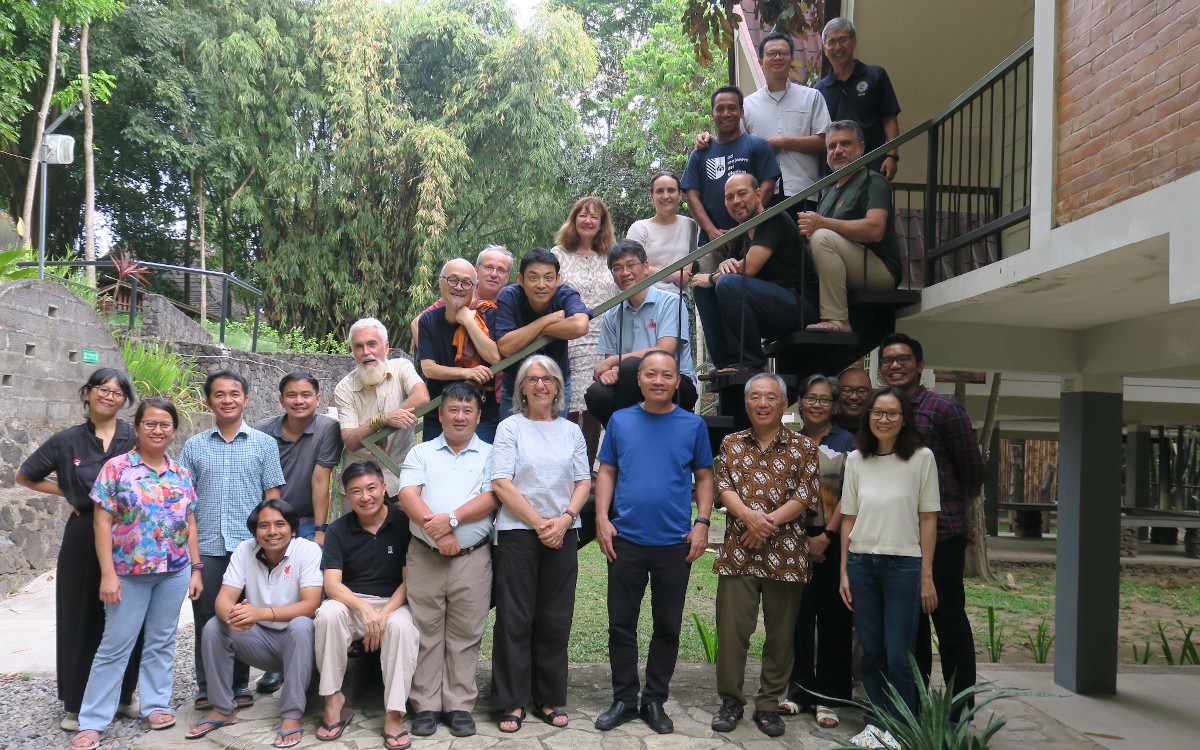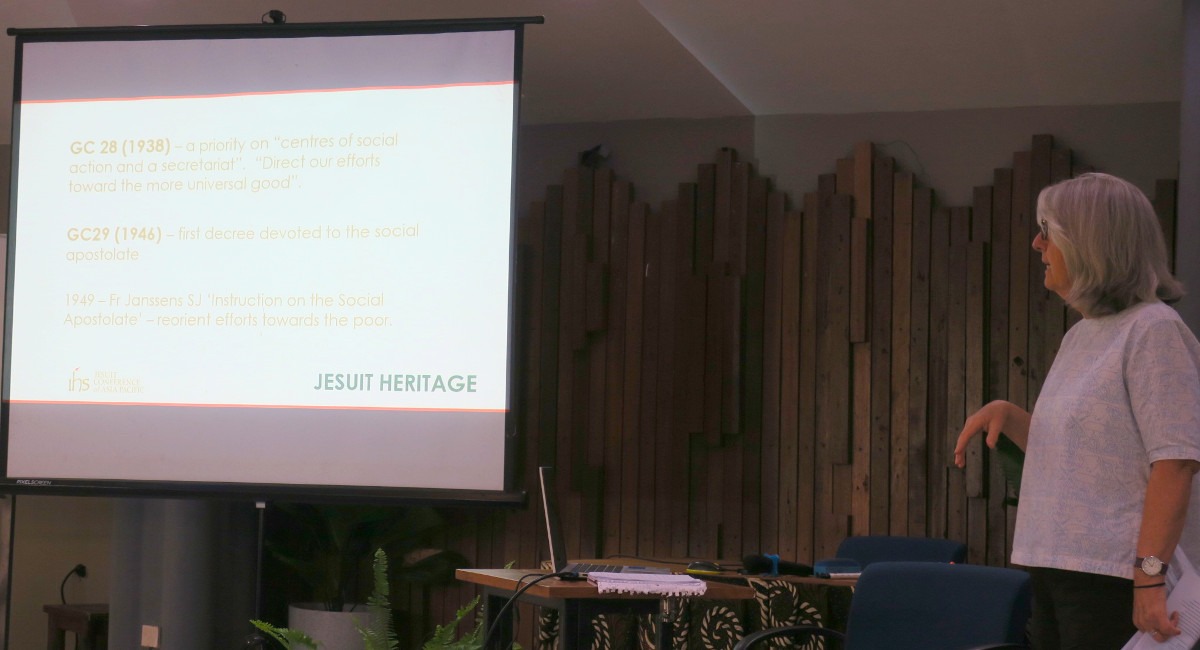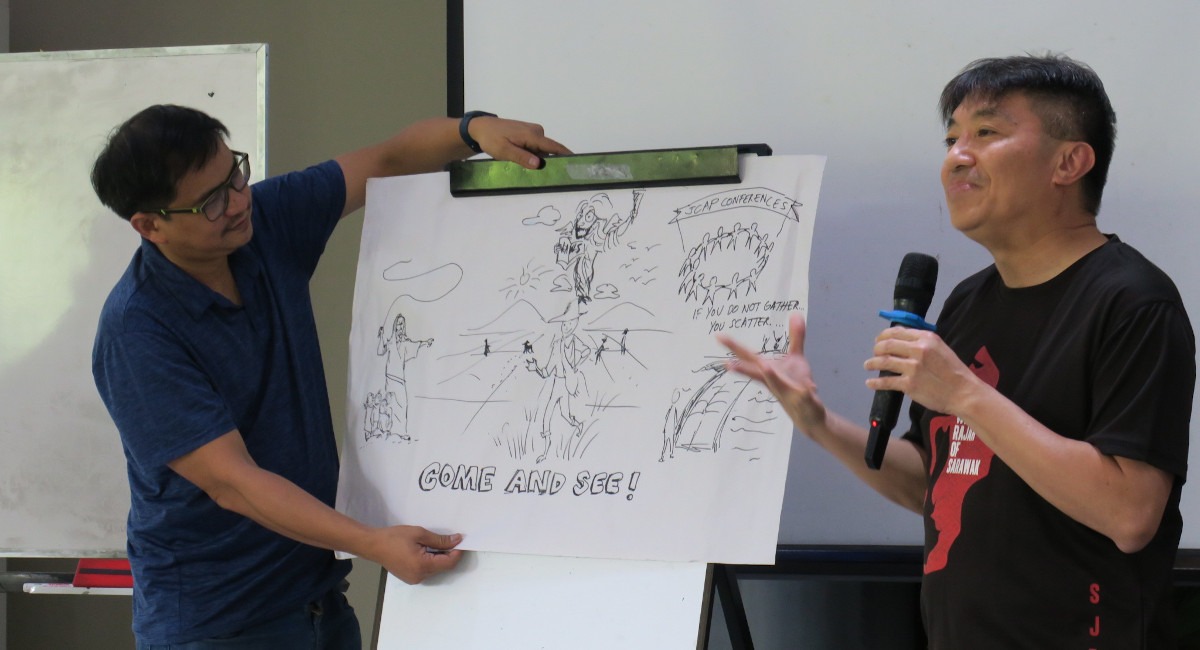
It was a busy first week of October at Kampoeng Media in Yogyakarta as the social apostolate delegates of our provinces, regions, and mission gathered for four days, exploring key areas of the social ministry work, challenges, and next steps.
Julie Edwards, conference Secretary for Social Ministries, provided an overview of JCAP within the broader context of the Society’s social apostolate. She noted the meeting in Spain in 2008 that identified common concerns that led to the formation of the Global Ignatian Advocacy Networks. The conference’s work is shaped by several key contexts, including past and recent General Congregations, the Universal Apostolic Preferences (UAPs) and the De Statu Societatis 2023. At a later presentation, Edwards revisited the Jesuit and Ignatian foundation of our social apostolate work, stressing the importance of explicitly communicating the Jesuit identity of our efforts and approaches to our ministries.
Helping ground the discussion was the presentation by Fr Benny Juliawan SJ on the evolving realities in Asia Pacific, particularly in the context of the digital economy. The Indonesian Provincial, who has a background in Development Studies and Sociology, explained how the digital age has produced a new business model built on online platforms. This has resulted in the proliferation of freelance, gig, and project-based work. While these changes offer new opportunities, they also create precarious working conditions for many, with inequality remaining a major issue as big tech companies control 90 percent of income and profit.
Fr Juliawan highlighted the International Labour Organization’s efforts to update the decent work framework to suit the digital economy, focusing on learning and skill, capacity building, and social protection, among others. Yet he noted that political discourse in the region often fails to address deeper moral and civic concerns. Perhaps this is a gap that the Jesuit social ministries can help fill by bringing attention to these critical issues.

Fr Juliwan’s presentation sparked further reflection in light of the conference’s current apostolic plan. JCAP President Fr Jun Viray SJ reiterated JCAP’s focus on the key global issues of migration and ecology and stressed the importance of greater inter-ministry and trans-conference collaboration. “We must creatively reimagine what we are doing, how our programmes can be better synergised with others, and form partnerships with organisations outside the Society,” he urged.
Fr Viray also reflected on the significance of discerning in common as our way of proceeding, emphasising its role in setting the direction of the social ministries. “Our ability to discern in common is what differentiates us from NGOs. We are not simply an NGO but are listening to where the spirit is leading us so we can do the missio dei.”
He encouraged the participants to engage in “apostolic dreaming,” envisioning what the social apostolate could achieve over the next five years. This visioning process, he suggested, would stimulate apostolic energy and inspire ways for collaboration and concrete action.
Indeed, the gathering underscored the importance of networking and collaboration. Fr Roberto Jaramillo SJ, Secretary for Social Justice and Ecology of the Society of Jesus, explained that networking is not merely about connecting people or organisations working towards similar goals but about developing a shared mission that transcends individual institutional interests. “Networking is very similar to the skeletal and muscular systems involved in making the spine, knee, and hand work,” Fr Jaramillo said, underscoring how essential collaboration is to the smooth functioning of social ministries.

At its core, networking implies a deep sense of generosity and shared responsibility, where “what is ours must be as important as what is mine”. Networking, according to Fr Jaramillo, is not an additional task but a way of proceeding, highlighting the transformative potential of being networked, not just networking. “We are not only networking, we are networked,” he pointed out, marking a significant shift in paradigm. He stressed that networks are not bureaucratic structures but spaces for apostolic articulation. This perspective encourages Jesuits and mission partners to see networks not as instruments for governing the Society, but as opportunities for dialogue.
Participants raised questions about leadership in a networked structure, especially when priorities and directions shift. Fr Jaramillo responded by emphasising the importance of discernment. “To be networked is to be changed internally. We need to have a strong spiritual foundation to allow the spirit to transform our lives,” he said.
In the plenary session that followed the spiritual conversations, participants acknowledged the importance of networking in the context of their ministries. Fr Julio Sousa SJ from Timor-Leste noted that “the call for us is to accept that we cannot do everything and focus on what we can do and how we can do it better”. Others discussed how to move forward in networking, especially in an era shaped by digital technology.

At the close of the conference, having heard various inputs, including practical tools to help in programme planning, voices from local Indonesian youth, and a presentation from Fr Peter Balleis on Jesuit Worldwide Learning, the participants divided into small groups and reflected on their vision for the future of the JCAP social ministries. Each group brought forth powerful metaphors to illustrate their collective hopes. One group drew a bridge, symbolising strong foundations and collaboration, while another depicted a garden, calling for unity and action. A third group illustrated a flowing river that, when viewed from another angle, resembled a tree with many branches, emphasising networks and “rowing into the deep,” and the final group imagined the social ministries to be a house under a tree, offering rest and support. Alongside it was an image of Ignatius leaning into the wind, with one foot raised and one hand holding another’s.

